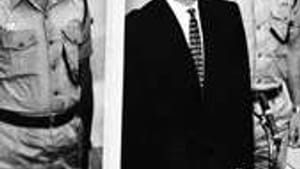Stay in the Loop
BSR publishes on a weekly schedule, with an email newsletter every Wednesday and Thursday morning. There’s no paywall, and subscribing is always free.
The heart, too, has its reasons: In defense of the Eichmann trial
Eichmann's trial: a response

Dan Rottenberg's recent commentary on the Eichmann death sentence is evocative and provocative, sufficiently so to evoke unexpectedly strong emotions in me. (To read it, click here.)
If I understand Dan's point of view correctly, he is saying that the principle of "an eye for an eye"— "your life for all of the lives you took"— is not the answer to violence of even the most horrific kind, in this instance the incomprehensible mass violence of the Shoah, and by implication other genocidal killing fields such as in Cambodia, or"“ heaven help us"“ the enslavement and subsequent segregation and humiliation of African Americans and the obliteration of the Native American population in our own country. Not to mention other slaughterhouses throughout the history of the world.
How exactly do we mete out justice in response to crimes against humanity?
Clearly, Dan is correct that the law of retaliation is not the answer to even these horrific slaughters of innocent millions. Yet in the case of Eichmann and other mass murderers, my emotions differ from the voice of reason. Emotions have an intelligence of their own; as Pascal put it, "The heart has reasons that reason does not know."
Forgive Hitler?
The need for justice lies deep in the human heart as much as it resides in legal and moral principles. Anyone who has been seriously victimized or witnessed victimization knows the inner demand of the heart for fairness and responsibility in response to such acts.
Surely it is true that as long as we— even the most horrifically victimized among us— hold on to blame and rage, we can't proceed to renew our lives.
Yet the human heart requires both mercy and justice. Since we are human, mercy should temper justice. But in some situations we find ourselves in no position to forgive and exercise mercy. The injustice is simply too extreme to do so. Who among the living is qualified to forgive Hitler, say, for the millions he murdered? In such cases our obligation is to carry out justice— but, for the sake of civilized life, to do it not as vigilantes but in accordance with established laws and principles.
Message to the victims
For all the shortcomings that Arendt pointed out, Adolf Eichmann's trial in Jerusalem in 1961 was one of the most necessary and civilized acts of justice in human history. Eichmann's captors could well have assassinated him. Yet Israelis chose to give him a fair trial and, indeed, treat him with dignity and civility throughout—a triumph of human reason.
Arendt scrutinized and questioned the legal aspects of the proceedings"“ as does Dan when he questions whether a single nation can speak for humanity (shouldn't Eichmann have been tried by an international tribunal?). But this trial was so much more than a legal proceeding.
It was an attempt"“ with some success— to impart to those who suffered, their loved ones and, in a spiritual sense, to the dead themselves— that a small degree of justice still remains in a world where all semblance of it seemed to have been destroyed. All things considered, the Eichmann trial was a noble example of justice at its most restrained and thoughtful.
Killing Bin Laden
The questions Dan raises about the appropriate response to horrific crimes, however, are not without merit and relevance today. Americans still live in the shadow of terrorism. How to respond ethically but forcefully to terroristic acts is an important part of coming to grips with this problem.
Should the Boston Marathon bomber be given the death sentence? Were we right to assassinate Bin Laden? Should we close Guantanamo? (At a more personal level, how should any of us treat someone who does us an injustice?)
These questions are similar to the ones confronted by the Eichmann court. They concern how we can restore civilized life, mercy and justice in the wake of unconscionable acts that devastate our worlds.
I don't think these problems admit of easy solutions. They are rendered even more complex by the fact that the human heart, so prone to error and misunderstanding, yet so much at the core of our individual and collective existence, calls out for a place in such discussions.♦
To read another response by Gresham Riley, click here.
To read a response by Robert Zaller, click here.
To read Dan Rottenberg's response to this essay, click here.
To read other responses, click here.
To read a follow-up by Victor L. Schermer, click here.
If I understand Dan's point of view correctly, he is saying that the principle of "an eye for an eye"— "your life for all of the lives you took"— is not the answer to violence of even the most horrific kind, in this instance the incomprehensible mass violence of the Shoah, and by implication other genocidal killing fields such as in Cambodia, or"“ heaven help us"“ the enslavement and subsequent segregation and humiliation of African Americans and the obliteration of the Native American population in our own country. Not to mention other slaughterhouses throughout the history of the world.
How exactly do we mete out justice in response to crimes against humanity?
Clearly, Dan is correct that the law of retaliation is not the answer to even these horrific slaughters of innocent millions. Yet in the case of Eichmann and other mass murderers, my emotions differ from the voice of reason. Emotions have an intelligence of their own; as Pascal put it, "The heart has reasons that reason does not know."
Forgive Hitler?
The need for justice lies deep in the human heart as much as it resides in legal and moral principles. Anyone who has been seriously victimized or witnessed victimization knows the inner demand of the heart for fairness and responsibility in response to such acts.
Surely it is true that as long as we— even the most horrifically victimized among us— hold on to blame and rage, we can't proceed to renew our lives.
Yet the human heart requires both mercy and justice. Since we are human, mercy should temper justice. But in some situations we find ourselves in no position to forgive and exercise mercy. The injustice is simply too extreme to do so. Who among the living is qualified to forgive Hitler, say, for the millions he murdered? In such cases our obligation is to carry out justice— but, for the sake of civilized life, to do it not as vigilantes but in accordance with established laws and principles.
Message to the victims
For all the shortcomings that Arendt pointed out, Adolf Eichmann's trial in Jerusalem in 1961 was one of the most necessary and civilized acts of justice in human history. Eichmann's captors could well have assassinated him. Yet Israelis chose to give him a fair trial and, indeed, treat him with dignity and civility throughout—a triumph of human reason.
Arendt scrutinized and questioned the legal aspects of the proceedings"“ as does Dan when he questions whether a single nation can speak for humanity (shouldn't Eichmann have been tried by an international tribunal?). But this trial was so much more than a legal proceeding.
It was an attempt"“ with some success— to impart to those who suffered, their loved ones and, in a spiritual sense, to the dead themselves— that a small degree of justice still remains in a world where all semblance of it seemed to have been destroyed. All things considered, the Eichmann trial was a noble example of justice at its most restrained and thoughtful.
Killing Bin Laden
The questions Dan raises about the appropriate response to horrific crimes, however, are not without merit and relevance today. Americans still live in the shadow of terrorism. How to respond ethically but forcefully to terroristic acts is an important part of coming to grips with this problem.
Should the Boston Marathon bomber be given the death sentence? Were we right to assassinate Bin Laden? Should we close Guantanamo? (At a more personal level, how should any of us treat someone who does us an injustice?)
These questions are similar to the ones confronted by the Eichmann court. They concern how we can restore civilized life, mercy and justice in the wake of unconscionable acts that devastate our worlds.
I don't think these problems admit of easy solutions. They are rendered even more complex by the fact that the human heart, so prone to error and misunderstanding, yet so much at the core of our individual and collective existence, calls out for a place in such discussions.♦
To read another response by Gresham Riley, click here.
To read a response by Robert Zaller, click here.
To read Dan Rottenberg's response to this essay, click here.
To read other responses, click here.
To read a follow-up by Victor L. Schermer, click here.
Sign up for our newsletter
All of the week's new articles, all in one place. Sign up for the free weekly BSR newsletters, and don't miss a conversation.

 Victor L. Schermer
Victor L. Schermer